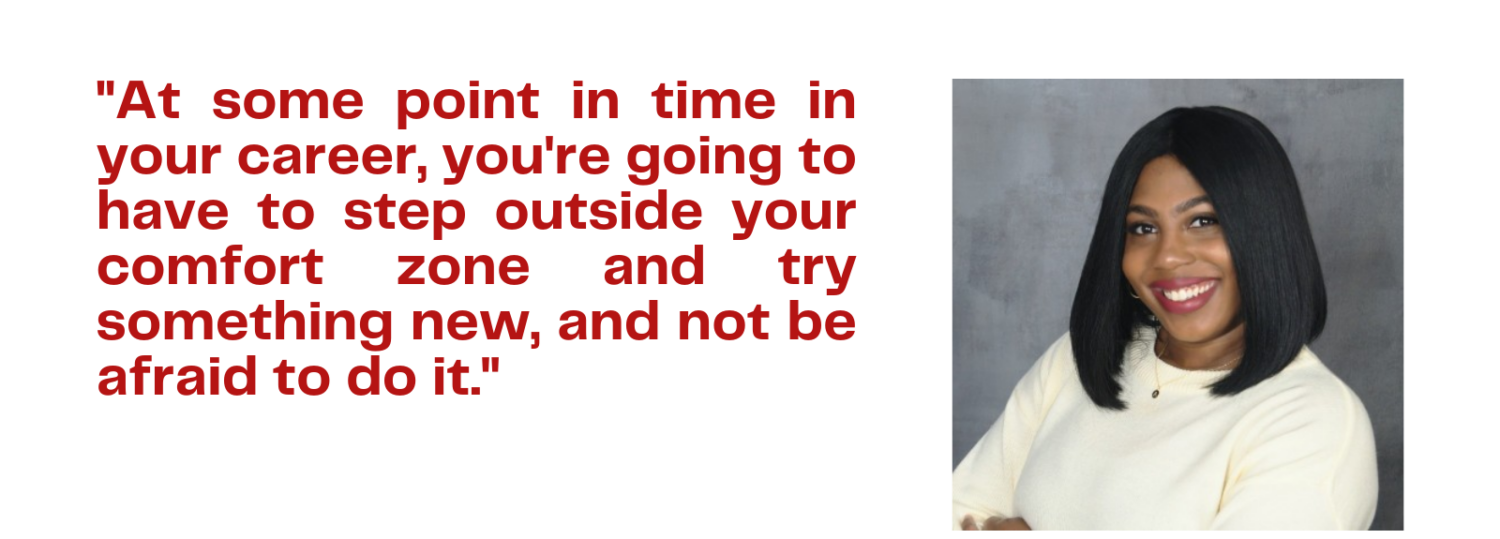Ayana Sadler graduated from the MSTC program in 2016 and now works as an Associate Brand Marketing Manager at Paraxel. Ayana completed her Bachelor of Art in Mass Communication and developed her interest in healthcare, marketing, and communications. These interests helped encourage her to come to NC State.
The MSTC program allowed Ayana the ability to merge her interests and passion for marketing and communications in healthcare with her interest in the pharmaceuticals and clinical research industry.
“NC State’s Technical Communication program is not only for people who want to pursue communication for the technology industry, but also the pharmaceutical and clinical research industry”
After graduating from MSTC, Ayana was able to pursue her goal of combining her interests, eventually leading her to her current role as an Associate Brand Marketing Manager in a healthcare-focused organization.
The following was edited for length and clarity by Elizabeth Stone, the 2021-22 TCA GSA Representative.
Q: What MSTC class do you believe best applies to your current role?
A: Writing in Nonacademic Settings really helped me the most. The class forced us to step outside the realms of our comfort zone and try projects that we weren’t familiar with.
Q: Throughout your time in the MSTC program, did you ever encounter any challenges?
A: Yes, absolutely. I just remember my first semester at MSTC. We were assigned to work with a partner on a project, that’s why I emphasize how important it is to understand how to work with others. It was just a really challenging project with really different perspectives. One person had more strength in this area, another person had more strength in this area and just tried to find the fine balance beyond just creating a great project. It was really challenging, but in the end, we did well. And it’s been a life lesson that I’ve been able to apply in my professional career regularly.
Q: What are some key responsibilities in your position?
A: I am responsible for building content around our enterprise services. That can be through social posts, newsletters, internal marketing, emails, etc, just to speak to our offerings.
Q: What are some necessary key skills to be successful in your marketing role?
A: You need to have a very creative mind, be unique, and offer new perspectives. When it comes to marketing, you must be able to contribute new ideas, so that you’re somewhat aggressive because you have a lot of marketers out there, and you have a lot of clinical research organizations out there. You need to be able to set yourself apart from other organizations. Also, of course, you need to be a great writer.
You need to know how to communicate and be flexible in your communication. I think the beauty of Technical Communication is that you don’t necessarily have to be an expert in that area, but you have to be a good writer so that you’re able to expand on whatever the subject matter may be. You have to be on top of things. I feel like we’re always getting updates on awards, or different clinical initiatives or partnerships.
Q: Do you follow a project management model in your current role?
A: I can definitely talk about different techniques that I learned from the tech comm professionals that really helped me better leverage and move in my career, such as documentation. You always need to have documentation, just so that you have that personal note. And if you need to share that information with somebody else, you have a log of what’s been done or created. I’ve also learned a lot about communicating with my fellow peers and embracing teamwork. In a professional setting, you’re always going to be faced with very keen skills or specific needs.
At some point in time in your career, you’re going to have to step outside your comfort zone, try something new and not be afraid to do it.
Q: What is the biggest challenge you’ve encountered in your current position?
A: As you can imagine, when it comes to clinical research or healthcare in general, there’s a lot of jargon when it comes to different types of disparities, diseases, or different stages in the clinical cycle that you are not familiar with. I find myself having to listen really closely whenever our thought leaders share a topic so that I’m able to correctly interpret it. But again, it’s a learning process, and it constantly pushes me out of my comfort zone.
Q: What is the most rewarding part of your role?
A: I really enjoy being in the healthcare space and also being able to work alongside people that are driving different clinical initiatives. I think that is very rewarding. Also, it’s just really nice to be able to highlight the people that are part of the process as well that I think to deserve more praise.
Q: What is the best piece of advice you would give to MSTC students who are interested in the healthcare industry?
A: I say go for it! I always believe it’s not what you know, but who you know. So it’s great to have an education and the fundamentals, but I also think it’s extremely important to network with alumni. So definitely leverage your network and don’t be afraid to network. You never know who may be helpful to you along the way in your career. Always be interested and eager to reach out to other professionals and don’t be afraid to ask questions!
